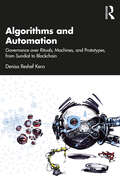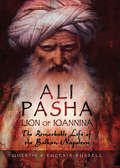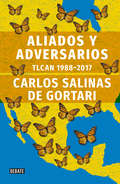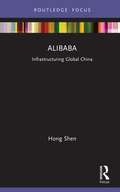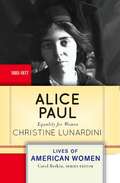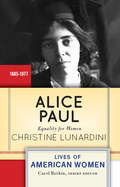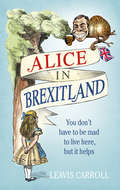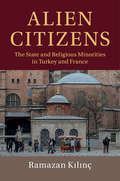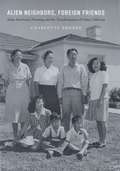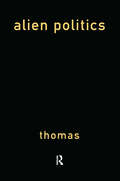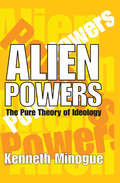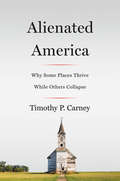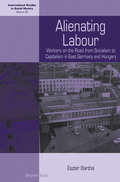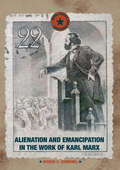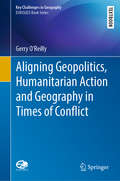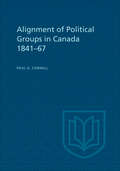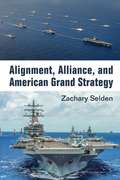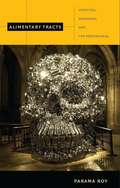- Table View
- List View
Algorithms and Automation: Governance over Rituals, Machines, and Prototypes, from Sundial to Blockchain
by Denisa Reshef KeraTo enact the book’s central theme of automation and human agency, the author designed a Bot trained on her book to support dialogue with the content and facilitate discussions. If you like to compare what the author says and Bot ‘interprets’ or generates, go here https://www.anonette.net/denisaBot/ Algorithms and Automation: Governance over Rituals, Machines, and Prototypes, from Sundial to Blockchain is a critical examination of the history and impact of automation on society. It provides thought-provoking perspectives on the history of automation and its relationship with power, emphasizing the importance of considering the social context in which automation is developed and used. The book argues that automation has always been a political and social force that shapes our lives and futures, rather than a neutral tool. The author provides a genealogy of automation, tracing its development from ancient rituals to modern-day prototypes, and highlights the challenges posed by new technologies such as blockchain and artificial intelligence. The volume argues that we need more democratic and accountable governance over technological innovation to ensure that it respects human rights, political pluralism, legitimacy, and other values we hold dear in our institutions and political processes. An engaging read on a fascinating topic, this book will be indispensable for scholars, students, and researchers of science and technology studies, digital humanities, politics and governance, public policy, social policy, system design and automation, and history and philosophy of science and technology. It will also be of interest to readers interested in the interactions of the sciences and the social sciences and humanities.
Ali & Ali
by Guillermo Verdecchia Marcus Youssef Camyar ChaiIn this sequel to the hilarious and hard-hitting The Adventures of Ali & Ali and the aXes of Evil, the agitprop collaborative team of Camyar Chai, Guillermo Verdecchia, and Marcus Youssef turns its idiosyncratic brand of political satire to new global realities.Following the election of U.S. president Barack Obama in 2008, collective optimism for a more tolerant, peaceful, and co-operative post- Bush world spreads to Canada - and to the backroom of Salim's Falafel Shoppe in Toronto. There, Ali Hakim and Ali Ababwa, refugee entertainers from the fictitious, war-torn country of Agraba, are inspired to write a stage play in celebration of the new president's message of "hope and change." The premiere of their Yo Mama, Osbama! (or, How We Learned to Stop Worrying and Love the Half-Black President) halts abruptly when an RCMP constable arrives at the theatre and arrests the pair for its financial ties to the Agrabanian People's Front, an alleged "terrorist organization" on the Canadian government's watch list.Continuity becomes more apparent than change when Ali and Ali are swiftly put on trial. As the hapless playwrights try to defend themselves in the farcical deportation hearing that unfolds, racial and cultural stereotypes are invoked - and lampooned - as quickly as dubious evidence is presented. But, in the midst of the biting comedy, more serious questions are raised about the cost for some when we endeavour to protect the "freedoms" of others.Cast of 1 woman and 3 men.
Ali Pasha, Lion of Ioannina: The Remarkable Life of the Balkan Napoleon
by Eugenia Russell Quentin RussellAt the beginning of the nineteenth century, the life of a petty tyrant in an obscure corner of the Ottoman Empire became the stuff of legend. What propelled this cold-blooded archetype of Oriental despotism, grandly known as the Lion of Yanina and the Balkan Napoleon, into the consciousness of Western rulers and the general public? This book charts the rise of Ali Pasha from brigand leader to a player in world affairs and, ultimately, to a gruesome end.Ali exploited the internal weakness of the Ottoman Empire to carve out his own de facto empire in Albania and Western Greece. Although a ruthless tyrant guilty of cruel atrocities, his lavish court became an attraction to Western travelers, most famously Lord Byron, and his military prowess led Britain, Russia and France to seek his alliance during the Napoleonic Wars. His activities undermined the Sultans authority and ultimately led to the Greek War of Independence.Quentin and Eugenia Russell describe his remarkable life and military career as well as the legacy he bequeathed in his homeland as a nationalist hero and further afield as inspiration for writers and artists of the Romantic movement.
Aliados y adversarios: 1988 - 2017
by Carlos Salinas de Gortari"'Matar el TLCAN' acarrearía muchos conflictos, entre ellos la pérdida de millones de empleos en Estados Unidos. Para México, las consecuencias serían aún peores" Carlos Salinas de Gortari En este libro, el expresidente Carlos Salinas de Gortari narra con agilidad la historia de un acuerdo que definió el rostro de México rumbo al siglo XXI: el Tratado de Libre Comercio de América del Norte. Relatada casi como una crónica de aventuras, esta obra es también la narración política y el recuerdo privado de la persona que propuso, cabildeó y concretó el TLCAN. Es éste un análisis que recuerda la importancia estratégica del tratado, los pormenores de su negociación, los resultados que ha entregado a lo largo de 24 años y el embate que ha sufrido por el gobierno de Donald Trump. Por ello, se trata de un libro urgente, que analiza el pasado, el presente y el futuro de un pacto comercial clave para más de 450 millones de personas en Canadá, Estados Unidos y México. Aliados y adversarios conjuga argumentos de fondo y datos concretos con la historia personal de un protagonista para resaltar la importancia de un tratado que definió el escenario de modernidad y globalización en el que vivimos actualmente.
Alibaba: Infrastructuring Global China (Global Media Giants)
by Hong ShenThis book examines the political-economic dynamics in the development of a leading global Internet giant: Alibaba. As both a prominent example of, as well as providing the basic infrastructure for, China’s outward expansion, Alibaba demonstrates the complex interplay between different state agencies and units of capital in the context of the rise of global China. Hong Shen investigates the development and expansions of Alibaba and discusses how Alibaba has not only become a leader of China’s increasingly globalizing internet but has also increasingly served as a basic infrastructure model for other Chinese companies to go global. Shen also addresses how this process has been constantly shaped and reshaped by complex state-capital interactions along the way. This book shows how different units of capital, both inside and outside of China, have interacted with Alibaba’s developmental strategies and illustrates how different state agencies, both domestic and international, have enabled or constrained the company’s development, especially its global expansion. This book will appeal to students and scholars of critical political economy of media, global media and digital industries, communication, technology and society, and internet studies. It will also be relevant to policy-makers working in the arena of global internet and trade policies.
Alice Paul
by Christine LunardiniAlice Paul: Equality for Women shows the dominant and unwavering role Paul played in the passage of the Nineteenth Amendment, granting the vote to American women. The dramatic details of Paul’s imprisonment and solitary confinement, hunger strike, and force-feeding at the hands of the U. S. government illustrate her fierce devotion to the cause she spent her life promoting. Placed in the context of the first half of the twentieth century, Paul’s story also touches on issues of progressivism and labor reform, race and class, World War I patriotism and America’s emerging role as a global power, women’s activism in the political sphere, and the global struggle for women’s rights. About the Lives of American Women series: Selected and edited by renowned women’s historian Carol Berkin, these brief biographies are designed for use in undergraduate courses. Rather than a comprehensive approach, each biography focuses instead on a particular aspect of a women’s life that is emblematic of her time, or which made her a pivotal figure in the era. The emphasis is on a "good read," featuring accessible writing and compelling narratives, without sacrificing sound scholarship and academic integrity. Primary sources at the end of each biography reveal the subject’s perspective in her own words. Study questions and an annotated bibliography support the student reader.
Alice Paul: Equality for Women (Lives of American Women)
by Christine LunardiniAlice Paul: Equality for Women shows the dominant and unwavering role Paul played in the passage of the Nineteenth Amendment, granting the vote to American women. The dramatic details of Paul's imprisonment and solitary confinement, hunger strike, and force-feeding at the hands of the U.S. government illustrate her fierce devotion to the cause she spent her life promoting. Placed in the context of the first half of the twentieth century, Paul's story also touches on issues of progressivism and labor reform, race and class, World War I patriotism and America's emerging role as a global power, women's activism in the political sphere, and the global struggle for women's rights.About the Lives of American Women series:Selected and edited by renowned women's historian Carol Berkin, these brief biographies are designed for use in undergraduate courses. Rather than a comprehensive approach, each biography focuses instead on a particular aspect of a women's life that is emblematic of her time, or which made her a pivotal figure in the era. The emphasis is on a "good read," featuring accessible writing and compelling narratives, without sacrificing sound scholarship and academic integrity. Primary sources at the end of each biography reveal the subject's perspective in her own words. Study questions and an annotated bibliography support the student reader.
Alice in Brexitland
by Lucien Young Leavis CarrollLying on a riverbank on a lazy summer’s afternoon – 23rd June 2016, to be precise – Alice spots a flustered-looking white rabbit called Dave calling for a referendum. Following him down a rabbit-hole, she emerges into a strange new land, where up is down, black is white, experts are fools and fools are experts...She meets such characters as the Corbynpillar, who sits on a toadstool smoking his hookah and being no help to anyone; Humpty Trumpty, perched on a wall he wants the Mexicans to pay for; the Cheshire Twat, who likes to disappear leaving only his grin, a pint, and the smell of scotch eggs remaining; and the terrifying Queen of Heartlessness, who’ll take off your head if you dare question her plan for Brexit. Will Alice ever be able to find anyone who speaks sense?
Alice: The Story of Princess Alice of Greece, Prince Philip's Extraordinary Mother
by Hugo VickersThe remarkable, moving story of Prince Philip's mother by eminent biographer Hugo Vickers, updated in this new edition - for fans of Kingmaker and The Lives and Deaths of the Princesses of Hesse'Gripping. Hugo Vickers has pulled off an extraordinary feat in describing the life - in many ways tragic - of Princess Andrew of Greece. It is not an exaggeration to say that this is a masterpiece.' - A. N. Wilson'Vickers tells this story with a sure touch and an expertise that only he can command' SUNDAY TIMES'A sympathetic, piquant and well-defined portrait of a spirited woman' LITERARY REVIEW'Sympathetic yet free of pathos, Vickers's life celebrates an unusual and fascinating woman' KIRKUS--------Princess Alice, mother of Prince Phillip, was something of a mystery figure even within her own family. Profoundly deaf, she was born at Windsor Castle in the presence of her great-grandmother, Queen Victoria, and brought up in England, Darmstadt, and Malta.In 1903 she married Prince Andrew of Greece and Denmark, and from then on her life was overshadowed by wars, revolutions, enforced periods of exile. Further crisis hit when, at the age of forty-five, she was removed from her family and placed in a sanatorium in Switzerland, where she was pronounced a paranoid schizophrenic. As her stay in the clinic became prolonged, there was a time where it seemed she might never walk free again.Yet she recovered.Illuminating and enthralling, eminent biographer Hugo Vickers's account of her life is as tumultuous and extraordinary as the times she lived through.
Alice: The Story of Princess Alice of Greece, Prince Philip's Extraordinary Mother
by Hugo VickersThe remarkable, moving story of Prince Philip's mother by eminent biographer Hugo Vickers, updated in this new edition - for fans of Kingmaker and The Lives and Deaths of the Princesses of Hesse'Gripping. Hugo Vickers has pulled off an extraordinary feat in describing the life - in many ways tragic - of Princess Andrew of Greece. It is not an exaggeration to say that this is a masterpiece.' - A. N. Wilson'Vickers tells this story with a sure touch and an expertise that only he can command' SUNDAY TIMES'A sympathetic, piquant and well-defined portrait of a spirited woman' LITERARY REVIEW'Sympathetic yet free of pathos, Vickers's life celebrates an unusual and fascinating woman' KIRKUS--------Princess Alice, mother of Prince Phillip, was something of a mystery figure even within her own family. Profoundly deaf, she was born at Windsor Castle in the presence of her great-grandmother, Queen Victoria, and brought up in England, Darmstadt, and Malta.In 1903 she married Prince Andrew of Greece and Denmark, and from then on her life was overshadowed by wars, revolutions, enforced periods of exile. Further crisis hit when, at the age of forty-five, she was removed from her family and placed in a sanatorium in Switzerland, where she was pronounced a paranoid schizophrenic. As her stay in the clinic became prolonged, there was a time where it seemed she might never walk free again.Yet she recovered.Illuminating and enthralling, eminent biographer Hugo Vickers's account of her life is as tumultuous and extraordinary as the times she lived through.
Alien Citizens: The State and Religious Minorities in Turkey and France (Cambridge Studies in Social Theory, Religion and Politics)
by Ramazan KılınçHow does international context influence state policies toward religious minorities? Using parliamentary proceedings, court decisions, newspaper archives, and interviews, this book is the first systematic study that employs international context in the study of state policies toward religion, and that compares Turkey and France with regard to religious minorities. Comparing Christians in Turkey and Muslims in France, this book argues that policy change toward minorities becomes possible when strong domestic actors find a suitable international context that can help them execute their policy agendas. The Turkish Islamists used the European Union to transform the Turkish politics that brought a reformist moment for Christians in the 2000s. The Far Right in France utilized the rise of Islamophobia in Europe to adopt restrictive policies toward Muslims. Ramazan Kılınç argues that the presence of an international context that can favor particular groups over others, shifts the domestic balance of power, and makes some policies more likely to be implemented than others.
Alien Neighbors, Foreign Friends: Asian Americans, Housing, And The Transformation Of Urban California
by Charlotte BrooksBetween the early 1900s and the late 1950s, the attitudes of white Californians toward their Asian American neighbors evolved from outright hostility to relative acceptance. Charlotte Brooks examines this transformation through the lens of California’s urban housing markets, arguing that the perceived foreignness of Asian Americans, which initially stranded them in segregated areas, eventually facilitated their integration into neighborhoods that rejected other minorities. <p><p> Against the backdrop of cold war efforts to win Asian hearts and minds, whites who saw little difference between Asians and Asian Americans increasingly advocated the latter group’s access to middle-class life and the residential areas that went with it. But as they transformed Asian Americans into a “model minority,” whites purposefully ignored the long backstory of Chinese and Japanese Americans’ early and largely failed attempts to participate in public and private housing programs. As Brooks tells this multifaceted story, she draws on a broad range of sources in multiple languages, giving voice to an array of community leaders, journalists, activists, and homeowners—and insightfully conveying the complexity of racialized housing in a multiracial society.
Alien Politics: Marxist State Theory Retrieved
by Paul ThomasAlien Politics retrieves from the writings of Marx an original theory of the state which remains viable and relevant today. Paul Thomas traces the process by which Marx's theory of the state as the instrument of the capitalist ruling class became transformed into communist dogma under the auspices of Lenin and other "official" Marxist stalwarts. He argues that Marx's writings still have something to teach us and should not be pulled down with the monoliths and mausoleums of communism.
Alien Powers: The Pure Theory of Ideology
by Kenneth MinogueThe term "ideology" can cover almost any set of ideas, but its power to bewitch political activists results from its strange logic: part philosophy, part science, part spiritual revelation, all tied together in leading to a remarkable paradox--that the modern Western world, beneath its liberal appearance, is actually the most systematically oppressive system of despotism the world has ever seen. Alien Powers: The Pure Theory of Ideology takes this complex intellectual construction apart, analyzing its logical, rhetorical, and psychological devices and thus opening it up to critical analysis.Ideologists assert that our lives are governed by a hidden system. Minogue traces this notion to Karl Marx who taught intellectuals the philosophical, scientific, moral, and religious moves of the ideological game. The believer would find in these ideas an endless source of new liberating discoveries about the meaning of life, and also the grand satisfaction of struggling to overcome oppression. Minogue notes that while the patterns of ideological thought were consistent, there was little agreement on who the oppressor actually was. Marx said it was the bourgeoisie, but others found the oppressor to be males, governments, imperialists, the white race, or the worldwide Jewish conspiracy.Ideological excitement created turmoil in the twentieth century, but the defeat of the more violent and vicious ideologies--Nazism after 1945 and Communism after 1989--left the passion for social perfection as vibrant as ever. Activist intellectuals still seek to "see through" the life we lead. The positive goals of utopia may for the moment have faded, but the ideological hatred of modernity has remained, and much of our intellectual life has degenerated into a muddled and dogmatic skepticism. For Minogue, the complex task of "demystifying" the "demystifiers" requires that we should discover how ideology works. It must join together each of its complex strands of thought in order to understand the remarkable power of the whole.
Alien Rule
by Michael HechterThis book argues that alien rule can become legitimate to the degree that it provides governance that is both effective and fair. Governance is effective to the degree that citizens have access to an expanding economy and an ample supply of culturally appropriate collective goods. Governance is fair to the degree that rulers act according to the strictures of procedural justice. These twin conditions help account for the legitimation of alien rulers in organizations of markedly different scale. The book applies these principles to the legitimation of alien rulers in states (the Republic of Genoa, nineteenth- and twentieth-century China, and modern Iraq), colonies (Taiwan and Korea under Japanese rule), and occupation regimes, as well as in less encompassing organizations such as universities (academic receivership), corporations (mergers and acquisitions), and stepfamilies. Finally, it speculates about the possibility of an international market in governance services.
Alienated America: Why Some Places Thrive While Others Collapse
by Timothy P CarneyRespected conservative journalist and commentator Timothy P. Carney continues the conversation begun with Hillbilly Elegy and the classic Bowling Alone in this hard-hitting analysis that identifies the true factor behind the decline of the American dream: it is not purely the result of economics as the left claims, but the collapse of the institutions that made us successful, including marriage, church, and civic life.During the 2016 presidential campaign, Donald J. Trump proclaimed, “the American dream is dead,” and this message resonated across the country. Why do so many people believe that the American dream is no longer within reach? Growing inequality, stubborn pockets of immobility, rising rates of deadly addiction, the increasing and troubling fact that where you start determines where you end up, heightening political strife—these are the disturbing realities threatening ordinary American lives today.The standard accounts pointed to economic problems among the working class, but the root was a cultural collapse: While the educated and wealthy elites still enjoy strong communities, most blue-collar Americans lack strong communities and institutions that bind them to their neighbors. And outside of the elites, the central American institution has been religionThat is, it’s not the factory closings that have torn us apart; it’s the church closings. The dissolution of our most cherished institutions—nuclear families, places of worship, civic organizations—has not only divided us, but eroded our sense of worth, belief in opportunity, and connection to one another.In Abandoned America, Carney visits all corners of America, from the dim country bars of Southwestern Pennsylvania., to the bustling Mormon wards of Salt Lake City, and explains the most important data and research to demonstrate how the social connection is the great divide in America. He shows that Trump’s surprising victory was the most visible symptom of this deep-seated problem. In addition to his detailed exploration of how a range of societal changes have, in tandem, damaged us, Carney provides a framework that will lead us back out of a lonely, modern wilderness.
Alienating Labour: Workers on the Road from Socialism to Capitalism in East Germany and Hungary (International Studies in Social History #22)
by Eszter BarthaThe Communist Party dictatorships in Hungary and East Germany sought to win over the “masses” with promises of providing for ever-increasing levels of consumption. This policy—successful at the outset—in the long-term proved to be detrimental for the regimes because it shifted working class political consciousness to the right while it effectively excluded leftist alternatives from the public sphere. This book argues that this policy can provide the key to understanding of the collapse of the regimes. It examines the case studies of two large factories, Carl Zeiss Jena (East Germany) and Rába in Győr (Hungary), and demonstrates how the study of the formation of the relationship between the workers’ state and the industrial working class can offer illuminating insights into the important issue of the legitimacy (and its eventual loss) of Communist regimes.
Alienation
by Frederick Neuhouser Alan E. Smith Rahel JaeggiThe Hegelian-Marxist idea of alienation fell out of favor during the post-metaphysical rejection of humanism and essentialist views of human nature. In this book Jaeggi draws on phenomenological analyses grounded in modern conceptions of agency, along with recent work in the analytical tradition, to reconceive of alienation as the absence of a meaningful relationship to oneself and others, which manifests itself in feelings of helplessness and the despondent acceptance of ossified social roles and expectations.A revived approach to alienation helps critical social theory engage with phenomena, such as meaninglessness, isolation, and indifference, which have broad implications for issues of justice. By severing alienation's link to a problematic conception of human essence while retaining its social-philosophical content, Jaeggi provides resources for a renewed critique of social pathologies, a much-neglected concern in contemporary liberal political philosophy. Her work revisits the arguments of Rousseau, Hegel, Kierkegaard, and Heidegger, placing them in dialogue with Thomas Nagel, Bernard Williams, and Charles Taylor.
Alienation
by Frederick Neuhouser Alan E. Smith Rahel JaeggiThe Hegelian-Marxist idea of alienation fell out of favor during the post-metaphysical rejection of humanism and essentialist views of human nature. In this book Jaeggi draws on phenomenological analyses grounded in modern conceptions of agency, along with recent work in the analytical tradition, to reconceive of alienation as the absence of a meaningful relationship to oneself and others, which manifests itself in feelings of helplessness and the despondent acceptance of ossified social roles and expectations.A revived approach to alienation helps critical social theory engage with phenomena, such as meaninglessness, isolation, and indifference, which have broad implications for issues of justice. By severing alienation's link to a problematic conception of human essence while retaining its social-philosophical content, Jaeggi provides resources for a renewed critique of social pathologies, a much-neglected concern in contemporary liberal political philosophy. Her work revisits the arguments of Rousseau, Hegel, Kierkegaard, and Heidegger, placing them in dialogue with Thomas Nagel, Bernard Williams, and Charles Taylor.
Alienation (New Directions in Critical Theory #4)
by Rahel JaeggiThe Hegelian-Marxist idea of alienation fell out of favor after the postmetaphysical rejection of humanism and essentialist views of human nature. In this book Rahel Jaeggi draws on the Hegelian philosophical tradition, phenomenological analyses grounded in modern conceptions of agency, and recent work in the analytical tradition to reconceive alienation as the absence of a meaningful relationship to oneself and others, which manifests in feelings of helplessness and the despondent acceptance of ossified social roles and expectations.A revived approach to alienation helps critical social theory engage with phenomena such as meaninglessness, isolation, and indifference. By severing alienation's link to a problematic conception of human essence while retaining its social-philosophical content, Jaeggi provides resources for a renewed critique of social pathologies, a much-neglected concern in contemporary liberal political philosophy. Her work revisits the arguments of Rousseau, Hegel, Kierkegaard, and Heidegger, placing them in dialogue with Thomas Nagel, Bernard Williams, and Charles Taylor.
Alienation and Emancipation in the Work of Karl Marx (Marx, Engels, and Marxisms)
by George C. ComninelThis book considers Karl Marx’s ideas in relation to the social and political context in which he lived and wrote. It emphasizes both the continuity of his commitment to the cause of full human emancipation, and the role of his critique of political economy in conceiving history to be the history of class struggles. The book follows his developing ideas from before he encountered political economy, through the politics of 1848 and the Bonapartist “farce,”, the maturation of the critique of political economy in the Grundrisse and Capital, and his engagement with the politics of the First International and the legacy of the Paris Commune. Notwithstanding errors in historical judgment largely reflecting the influence of dominant liberal historiography, Marx laid the foundations for a new social theory premised upon the historical consequences of alienation and the potential for human freedom.
Aligning Geopolitics, Humanitarian Action and Geography in Times of Conflict (Key Challenges in Geography)
by Gerry O'ReillyThis textbook offers valuable insights into the nexus between geography, geopolitics, and humanitarian action. It elucidates concepts regarding conflict and power, as well as the role of the state and the international community in mitigating and preventing violence and war. Here the material and non-material, existential or imagined reasons for conflict are deconstructed, ranging from land and resource grabs to Utopian ideals that can degenerate into dystopias, as with Daesh’s caliphate in Syria and Iraq. In turn, the issues discussed range from the local to wider national and global levels, as do their resolution mechanisms. Due to insecurities, the impacts of globalization, divisive nationalistic and isolationist reactions emerging in some democracies including the USA, the UK’s Brexit stress, and the ominous rise of populist parties across continental Europe (from France and the Netherlands to the Visegrád Group, the Balkans, and Greece), citizen fatigue has become increasingly evident, reflected in ever-growing socio-political malaise and violence.As the impact of any humanitarian disaster is proportional to the level of development of the area affected, concepts and categories of humanitarian action are explored, along with development issues at their core, especially in the Global South. Broadly speaking, humanitarian disasters fall into the categories of natural, human-made, technological, or complex; here, however, the focus is on human-made crises. Attempts at greater regulation, national and international organization and multilateralism to prevent violent conflicts, as well as enhanced responses to humanitarian emergencies, need to be supported now more than ever before.This textbook will appeal to graduate and upper undergraduate students and practitioners in the fields of geography, geopolitics, humanitarian action and geographies of conflict and war. In addition to the main content, it includes exercises, questions and sections for autonomous student learning.
Alignment of Political Groups in Canada 1841-67 (Canadian Studies in History and Government)
by Paul G. CornellThe period of the union between the provinces of Upper and Lower Canada which preceded the general federation of the British North American provinces in 1867 is a fruitful field of investigation for students of Canadian politics and history, for from it stem many of our political traditions. Professor Cornell in the present study has been concerned with the question of how far the parties of that time were already identifiable and continuing groups. He has examined the Journals of the Legislative Assembly of the Province of Canada for all the sessions from 1841 to 1866, recording the votes of each member in all divisions that involved important issues, and from this careful and extensive study he has been enabled to draw some definite conclusions about the alignment of members and groups in the assembly.<p><P>The analysis proceeds not only by way of narrative but also by means of many charts and tables showing the votes of individual members on certain key issues from assembly to assembly. The author defines as far as possible the political outlook or affiliation of the individuals dealt with, and assesses the cohesion of the Radical and Conservative groups in Canada West and the Bleus and Rouges of Canada East. The result is an important contribution to our knowledge of the political groupings and of the political battles of the era, presented in the close detail that will make it an invaluable work of reference for all those working in the period.
Alignment, Alliance, and American Grand Strategy
by Zachary SeldenAlthough US foreign policy was largely unpopular in the early 2000s, many nation-states, especially those bordering Russia and China, expanded their security cooperation with the United States. In Alignment, Alliance, and American Grand Strategy, Zachary Selden notes that the regional power of these two illiberal states prompt threatened neighboring states to align with the United States. Gestures of alignment include participation in major joint military exercises, involvement in US-led operations, the negotiation of agreements for US military bases, and efforts to join a US-led alliance. By contrast, Brazil is also a rising regional power, but as it is a democratic state, its neighbors have not sought greater alliance with the United States. Amid calls for retrenchment or restraint, Selden makes the case that a policy focused on maintaining American military preeminence and the demonstrated willingness to use force may be what sustains the cooperation of second-tier states, which in turn help to maintain US hegemony at a manageable cost.
Alimentary Tracts: Appetites, Aversions, and the Postcolonial
by Parama RoyIn Alimentary Tracts Parama Roy argues that who eats and with whom, who starves, and what is rejected as food are questions fundamental to empire, decolonization, and globalization. In crucial ways, she suggests, colonialism reconfigured the sensorium of colonizer and colonized, generating novel experiences of desire, taste, and appetite as well as new technologies of the embodied self. For colonizers, Indian nationalists, diasporic persons, and others in the colonial and postcolonial world orders, the alimentary tract functioned as an important corporeal, psychoaffective, and ethicopolitical contact zone, in which questions of identification, desire, difference, and responsibility were staged. Interpreting texts that have addressed cooking, dining, taste, hungers, excesses, and aversions in South Asia and its diaspora since the mid-nineteenth century, Roy relates historical events and literary figures to tropes of disgust, abstention, dearth, and appetite. She analyzes the fears of pollution and deprivation conveyed in British accounts of the so-called Mutiny of 1857, complicates understandings of Mohandas K. Gandhi's vegetarianism, examines the "famine fictions" of the novelist-actor Mahasweta Devi, and reflects on the diasporic cookbooks and screen performances of Madhur Jaffrey. This account of richly visceral global modernity furnishes readers with a new idiom for understanding historical action and cultural transformation.
